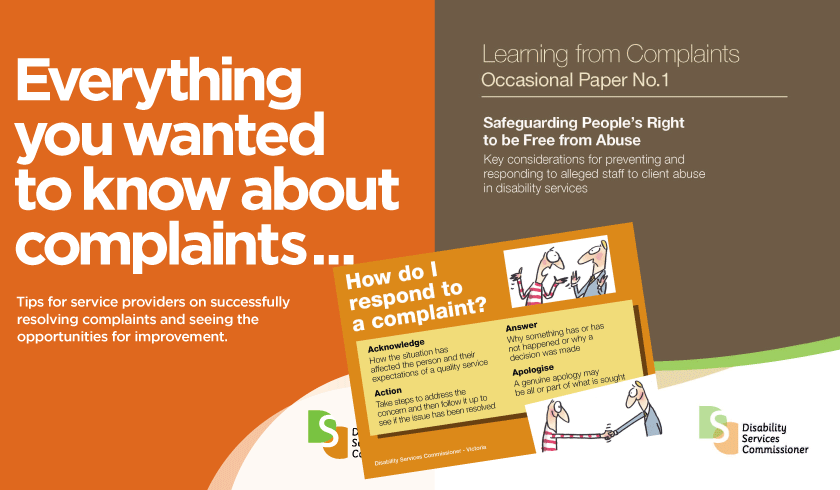Download in PDF (57 KB)
The Disability Services Commissioner (DSC) can decide to investigate complaints. In conducting an investigation, DSC has powers to compel evidence and inspect services. This helps us decide whether the issues raised are justified, and informs the actions that need to be taken by the disability service provider.
Why would DSC decide to investigate a complaint?
The Commissioner can decide to investigate a complaint if he believes that the complaint is not suitable for conciliation; or conciliation has been tried and has not worked, and further action is required.
For example, an investigation may be conducted if the issues raised in the complaint relate to allegations of abuse, assault or neglect as these issues are not suitable for conciliation.
What happens after DSC decides to investigate a complaint?
In most cases, any service provider involved in an investigation will be given notice within 14 days of the decision to investigate. DSC will also inform the person who made the complaint of the decision to conduct an investigation.
DSC will prepare an investigation plan which includes:
- Expected timelines
- The issues to be investigated
- Who will be interviewed and what documents will be requested
- Specific activities such as inspecting premises of a disability service.
What happens during a DSC investigation?
DSC investigators collect and assess information on the issues raised in the complaint.
DSC can collect information in the following ways:
- DSC Authorised Officers have the power to inspect the premises of a disability service and:
- Make enquiries in relation to people with a disability at the service.
- Obtain access to relevant documents to examine, copy, and remove them.
- See and interview a person with a disability, and their relatives or support persons
- Require the disability service’s staff members and volunteers to answer any questions.
- DSC may take spoken or written submissions.
- DSC may send for persons, documents or things.
- DSC may conduct a hearing and require documents to be produced and people to attend and give evidence.
Service providers must provide DSC with assistance during these investigations and visits. However, people may refuse to answer questions if the answer would incriminate them or if it is about a confidential communication between a person and their lawyer.
What happens after an investigation?
DSC will decide whether the complaint is justified and if the service provider should take any action, which may also resolve the complaint.
DSC will provide written notice of their decision and the reason for this decision to both the person who made the complaint and the service provider.
If issues in the complaint are found to be justified, the written notice to the service provider may also outline what actions should be taken to remedy the complaint.
DSC may undertake a follow-up investigation to confirm what action a service provider has taken in response to the written notice.
What if I have concerns about my rights in an investigation?
If you are concerned about your rights in the investigation process, the conduct of DSC throughout the investigation, or any aspect of the investigation process, you can contact our Principal Legal Officer on 1300 728 187.
Contact us
Phone (preferred): 1800 677 342 (free call from landlines)
Website: www.odsc.vic.gov.au
Fax: 03 8608 5765
Email: ODSCInvestigations@odsc.vic.gov.au
National Relay Service: www.relayservice.gov.au then 1800 677 342
Download in PDF (57 KB)










